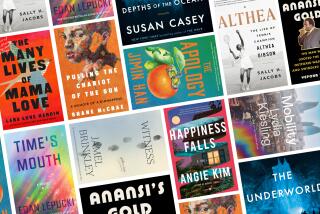Chasing the Tao
- Share via
One day in March 1976, an Italian journalist named Tiziano Terzani went with a friend to see a fortuneteller in a run-down district of Hong Kong. Up a dank stairway in a narrow tenement, an elderly Chinese man with a shaved head and a sleeveless vest measured Terzani’s forearm with a string, felt his forehead and considered the date and time of his birth.
Terzani, with little belief in such things, expected to be told some vague claptrap about when he would get rich, the obsession in Hong Kong. Instead, the fortuneteller gave him a specific warning: “Beware! You run a grave risk of dying in 1993. You mustn’t fly that year. Don’t fly, not even once.”
Terzani was momentarily taken aback but regained his composure once he was back on the street. It was 1976, and 1993 seemed a long way off. It sounded like an arbitrary year, 1993. But the incident lingered in the back of his mind. Over the years, as he worked and traveled across Asia, he never forgot the little old man in Hong Kong and his prophecy.
As 1992 drew to a close, Terzani was a correspondent covering Southeast Asia based in Bangkok, flying frequently to one or another of two dozen countries in the region. The idea of avoiding air travel, in his job, seemed a joke. Or was it?
It occurred to Terzani that he might actually welcome a break from air travel, which he found increasingly impersonal and detached as airports become modern and all look the same. Besides, he loved trains and ships. Travel overland, he guessed, would give him a new perspective on time and on the geography and on the cultures of Asia.
His journalist friends thought he was nuts. Some asked if Terzani had fallen under the spell of a fortuneteller. Actually, Terzani had an urge to step off his track, as we all do now and then. “The truth is that at 55, one has a strong urge to give one’s life a touch of poetry, to take a fresh look at the world, reread the classics,” he wrote. “This was my chance, and I could not let it slip.”
Smart move. “A Fortune-Teller Told Me,” his account of that year, is an utterly charming and engaging travel book that offers vivid portraits of unusual corners of Asia, told by a skilled raconteur whose eyes were open wide. An experienced traveler, he knew as he set out that it mattered less where he went than that he was open to people and adventures crossing his path. But he did not know how deep the path would become.
Journalism too often follows predictable paths. The best journalists always find a fresh way to look at familiar territory. In Asia, during the 1980s and ‘90s, most news stories covered economic boom or political contraction. Terzani’s decision to go overland, go slower and go deeper allowed him to look beyond surface trends.
Terzani employed a simple but clever device, and it gives his story a special glue. Whenever he arrived in a new town, he sought out the best-known fortuneteller and requested a reading. He approached each one with an open mind and a good sense of humor and lost none of his journalist’s power of perception and skepticism.
Some were hokey. Some were smooth charlatans, saying things that sounded insightful but were actually general and silly. And a number were remarkable readers of the human condition, with psychic gifts that enabled them to see deep enough inside Terzani’s soul that he found it chilling. His accounts of these visits are reliably funny.
Yet visiting fortunetellers gave Terzani more: a new way to see the local culture of each country he visited. In Asia, consulting an oracle of some kind is so common and revered by people of every class and social rank that Terzani humbly admits that he had been wrong, in the past, to ignore this aspect of life. Asian friends and acquaintances, when they learn of his new interest in fortunetelling, talk to him in a more serious and open way.
Terzani knew his adventure was a risk. There were several moments when--seasick, homesick, bus-sick--he wondered if he had made a yearlong mistake. But the payoff gradually took shape, not just in the stories he came across in his slow and circuitous land routes but also in the new way he saw Asia, where he had already lived for more than 25 years. “What looked like a curse proved to be a blessing,” he wrote. “I was marked for death, and instead I was reborn.” Moving slowly, Terzani recovered the taste for adventure and discovery of his youth and was able to report with enthusiasm and insight. There are arresting images aplenty: In a forest in northern Burma, he found a chain-gang of political prisoners doing hard labor for taking part in street demonstrations for democracy, 20 emaciated men in dusty rags, chained together at the ankle and waist, moving like one long centipede. In Thailand, he listened to a fortuneteller counsel the madam of a border town brothel to use a folk cure of raw garlic and red peppers to slow the spread of AIDS among her working girls and to ignore the condoms favored by a government sex education campaign.
Terzani interviewed Khun Sa, the drug lord who operated out of the Burmese jungle, about the world’s main source of heroin. But what really tickled Terzani was his offhand question about Khun Sa’s birth date, Feb. 22, 1934. On his next visit to a fortuneteller, Terzani offers that birth date as his own. To his great amusement, the fortuneteller divined a detailed description of what could have been Khun Sa’s life: a difficult childhood, a charismatic personality, uncountable love affairs and children, a talent for business.
Terzani came to see the larger role of fortunetelling in Asia, where political leaders often use oracles, numerology and astrology in governance. For instance, Terzani reports that Ne Win, the dictator of Burma, was so obsessed with lucky numbers that he instructed that the national currency, the kyat, be issued in denominations of 45, 75 and 90 because he considered them auspicious.
More than anything, Terzani’s new approach of slow travel and greater contemplation lead him to look more deeply at his own life. Happily married and enjoying his career as a writer, Terzani did not need a new direction as much as a new lens on life. It’s a familiar tale of midlife shift, but Terzani tells it creatively and beautifully.
“Think of how many wonderful people we meet without realizing it, of how many beautiful things we pass every day on the way home without noticing them. It always requires the right occasion, a particular event, a person who stops you and draws your attention to this or that.”
Toward the end of his year, Terzani tried meditation for the first time, shamed by a friend who asked how he could possibly have lived in Asia for so many years without tasting such a basic Buddhist delight. At a meditation retreat, Terzani struggled for days, unable to get past the pain of sitting cross-legged for hours. But he eventually reached a new level of peace, and it was a powerful revelation.
Terzani equated meditation with swimming or reading, an essential part of life that he did not even know he was missing. Terzani felt silly, in retrospect, that over the years he had visited hundreds of temples, spent whole days in Buddhist monasteries, acquired dozens of statues of Buddha but never really asked himself what everyone was doing sitting in a lotus position with half-closed eyes.
Terzani’s year off was possible only because he was able to persuade his employers at Der Spiegel, the German magazine, to give him the time to approach his job in this novel way, even when it meant dispatching another correspondent to cover breaking news that could not wait for Terzani’s ship to arrive.
And the old fortuneteller’s prophecy may have come true. On March 20, 1993, during a U.N.-supervised election in Cambodia, a U.N. helicopter crashed with 15 journalists aboard, one of them a German colleague from Der Spiegel who was sent to take Terzani’s place. He was not injured, but the crash made Terzani happy about his choice.
More to Read
Sign up for our Book Club newsletter
Get the latest news, events and more from the Los Angeles Times Book Club, and help us get L.A. reading and talking.
You may occasionally receive promotional content from the Los Angeles Times.










